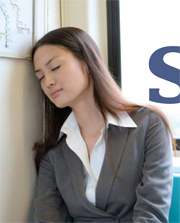How Did You Sleep Last Night?Powerful Patient, 2008 Week 32Joyce Graff, host, on webtalkradio.net Beginning August 4, 2008
Gayle Williams, Deputy Health Editor for Consumer Reports, talks with us about her latest report on sleep. Sleep is essential for health. It’s the time our bodies need to repair, replenish, and revitalize our bodies and our minds. Are you getting enough sleep?
About Our Guest
Gayle Williams is Deputy Health Editor for Consumer Reports. She was instrumental in the preparation of the report in the 2008 issue of Consumer Reports of a survey of 1,466 adults in the United States and their sleep habits, and of a product report reviewing with a dozen panelists of three sound machines at three price points. You can listen to these three sound machines at www.ConsumerReportsHealth.org. You can also take a quiz to see how your own experience compares to that of the respondents to the sleep survey.
About Sleep
Sleep is essential to health. Is it the time your body takes to heal itself, and to correct any changes that may have occurred during the day that might become problematic. Every day we are bombarded with sunshine and environmental factors that can cause genes to change and might, if not repaired, turn into cancers. Our bodies have the power to repair these changes, if given the time and nutrition to do the repairs.
Some startling facts are included in this report. Almost one in five Americans took prescription or over-the-counter medicines at least once a week to help them sleep. Although sleep medications are usually recommended for no more than two weeks, 14% of those surveyed took some type of pill on at least eight of the past 30 nights; 5% turn to pills every night of the month.
63% of those who took sleep medications experienced side effects; 24% said they became dependent on the medication they used; and 21% said that repeated use reduced the drug’s effectiveness. Among the 15% who had taken a prescription drug during the preceding month, a disturbingly high 38% said they have been on the medication for more than two years.
There are many workable strategies for helping you get to sleep that do not rely on pills. Try all of those first before reaching for any pill bottle.
If you are taking sleep medication, talk with your doctor about reducing your dependence on them, or ask about moving to a natural remedy instead (herbal tea or melatonin).
Best ways to promote sleep:
Nutrition and Sleep
One topic not dealt with in this report is the topic of foods and sleep. One of my favorite remedies for a night when sleep is slow in coming is a hot cup of camomile tea, which is easily obtained in the grocery store. There are other herbal teas formulated to relax you. You should avoid all caffeine (including green tea and soft drinks) after 3 pm.
David Sandoval, one of our recent guests, has an audio program “Better Sleep” where he discusses sleep which confirms all the advice in this program but in addition has some supplements to suggest, especially for people who have problems getting to sleep.
ConsumerReportsHealth.org also has a report on the effects of omega-3 oils and depression.
About Jetlag
Joyce is an expert on resolving jetlag without sleep medication. If you would like to have her paper on jetlag, please write to questions@powerfulpatient.org References
Excerpts from the following were used in the production of this show:
Myths and Facts About Sleep, May 09, 2008, from the Cleveland Clinic Jerome Groopman, M.D., How Doctors Think (Houghton Mifflin, Boston, 2007), pages 210, 222.
|
